Don’t look now but the market is back to all-time highs.
And for a lot of money managers who have been sitting on the sidelines parked in cash are feeling their heart-racing.
It’s a feeling I know all too well…the almost magnetic pull towards a trade, driven by the fear of missing out on what seems like a quick money grab.
FOMO is common regardless of your skill level and experience.
It’s that voice whispering… Act now or regret it forever…pushing you towards impulsive decisions that can jeopardize your trading account.
For some, it’s an account killer, a dream crusher.
It clouds judgment, undermines strategy, and worst of all, it can turn what should be a calculated game of chess into a reckless roll of the dice.
But it doesn’t have to be that way.
Today, I’m going to unveil 5 transformative strategies to help you master your trading impulses and make smarter, more informed decisions.
These aren’t just tips—they’re game-changers
Table of Contents
#1: Understanding and Acknowledging FOMO Triggers

FOMO often stems from a deep-rooted fear of regret and a desire to always be in the winning circle.
It’s exacerbated by social media and community forums where traders frequently share their success stories, creating a skewed perception of constant opportunity and success.
Most of them are not transparent, hiding their losses, and throwing off the impression that trading is easy and that there is something wrong with you if you’re not making thousands of dollars each day from the jump.
The Fix:
Start a trading journal. Document not just your trades, but also your emotional state and the market conditions.
For instance, note if you felt compelled to trade because others were boasting about their gains in a particular stock.
Over time, this journal will help you identify patterns in your FOMO triggers.
Even after 20 plus years of trading, I still journal all my trades, and review them. I even make video lessons and share them with my students.
#2: Setting Clear, Personalized Trading Goals

FOMO thrives in the absence of a clear trading strategy. When traders don’t have set goals, they’re more likely to chase after every opportunity in fear of missing out.
The other day I traded CCCC perfectly. I had a clear goal of getting on a panic dip buy and out quickly. And it played out perfectly.
However, the stock surged after I exited the trade. Sometimes I’ll let that upset me…knowing I was in the right play and had a great entry.
Which pushes me to trade the symbol again, this time with bigger size, thinking I will get the same result.
And I tried to play CCCC again, this time with more size than I should have, which left me with little wiggle room. I got out of the position with a small loss, but the strategy was off.
Ironically, XGPT, my AI powered alert system nailed CCCC. It had a buy signal at $2.75…and yesterday the stock traded over $6.
A new XGPT alert is sent out at 3:15 PM ET, every day.
To find out more on how you can receive it— CLICK HERE.
And now $CCCC is int the $3s after-hours….congrats to allll https://t.co/6cuTVNItqN subscribers and https://t.co/tuum2PPwIW as this one checked off multiple boxes thanks to a solid deal with $MRK and I just sold too soon/played it far too safe. Good lesson/reminder for me! https://t.co/OwmdrHHrZX
— Timothy Sykes (@timothysykes) December 13, 2023
The Fix:
Define your trading objectives based on your risk tolerance, and timeline. For example, if your goal is quick and fast profits, focus on catalyst driven stocks.
More Breaking News
- Is AMD’s Stock Skyrocketing Too Fast? Exploring the 4.5% Gain
- Microvast Holdings Inc.: Stock Surge Sparks Investment Debate
- SOBR Stock’s Roller Coaster: An Analysis of Recent Volatility and Key Financials
This clarity will help you stay focused and avoid distractions.
#3: Developing a Robust Risk Management Strategy

The allure of a ‘big win’ can often overshadow the practical aspects of trading, like risk management.
FOMO can push traders into positions that are too risky or poorly timed.
Whewwwwwww, what a day! How'd you do?!?! Did you stay patient/meticulous or did you gamble and #hodl like too many degenerate traders do?!
— Timothy Sykes (@timothysykes) December 13, 2023
The Fix:
Implement strict risk management rules. For instance, decide in advance what you’re willing to risk and where you plan to exit in case you’re wrong.
This rule can serve as a safety net, preventing impulsive decisions driven by FOMO.
In fact, cutting losses quickly is my number one trading rule. And it’s the reason why I’ve been able to outlast so many of my peers in this game.
#4: Embracing a Long-term Perspective

FOMO is often rooted in short-term thinking. The fear of missing out on an immediate opportunity can overshadow the benefits of long-term planning.
My two best students, both with over eight-figures in trading profits, showed no signs of greatness their first year if you judged them on their PnL.
In fact, they probably would have quit if they rated themselves on how much they made that first year.
However, like all my millionaire students, they had a long-term perspective. They judged themselves on learning…and trying to get better each day.
11:11pm study/dream check, who's still up studying and promises to dream big and then work your butt off to turn your big dreams into reality?!?! HOW BAD DO YOU WANT SUCCESS AND HOW HARD WILL YOU PUSH YOURSELF TO ACHIEVE IT?!?!?
— Timothy Sykes (@timothysykes) December 13, 2023
The Fix:
Focus on improving each day. Learn one aspect of the trade that will make you better. Don’t judge yourself on how much money you make or lose in the beginning. If you do the right things for a long enough period…the results should follow.
But don’t rush the process…everyone’s journey is different.
#5: Engage in Community Support

FOMO can also arise from a lack of confidence in one’s own trading decisions, often due to insufficient knowledge.
The Fix:
Stay connected with a supportive trading community.
For instance, participate in webinars, read up on the latest catalysts, trends, and discuss strategies with fellow traders.
This not only improves your understanding of the markets but also provides a reality check when you’re tempted by FOMO-driven trades.
There’s a reason why my community has over 30 millionaire students…and that’s because we support each other.
Congrats to everyone who uses https://t.co/6cuTVNItqN and nailed $CCCC $ALT or $ADTX today….sooooo many big runners, you gotta love this market if you're prepared to capitalize on allll the volatility! How'd you do so far today, did you crush it like my top students & I did?
— Timothy Sykes (@timothysykes) December 12, 2023
Conquer FOMO and Trade with Precision: Discover the Power of XGPT! 🚀

As a seasoned trader and mentor, I’ve navigated the highs and lows of the market, turning strategies into success stories. But even with experience, trading in today’s fast-paced market requires more than just intuition – it demands precision, speed, and insight.
That’s where XGPT comes in, revolutionizing the way we trade with AI-powered precision.
Explore How XGPT Elevates Your Trading Game:
📈 Master Complex Patterns: With XGPT’s advanced pattern recognition, spot profitable opportunities that others miss.
🤖 Decisions Free from Bias: Let AI analyze the data, helping you to make informed, emotion-free trades.
📊 Craft a Winning Trading Plan: Utilize AI insights to develop strategies that align with your goals and risk appetite.
🚀 Leverage Real-Time Insights: Stay ahead with swift, up-to-the-minute market analysis.
📰 Deep Dive into Market Dynamics: Understand the underlying sentiment driving market trends.
XGPT has already proven its worth, uncovering gems like CCCC, signaling a buy before it soared – a clear edge in a volatile market.
Ready to Transform Your Trading Experience? 📈
Watch this exclusive interview and:
🚀 Learn practical, AI-driven strategies to tackle today’s market challenges.
🔍 Experience live, real-time market analysis, unveiling hidden opportunities.
📈 Break away from the herd – predict and capitalize on market trends.
Your journey to becoming a more informed, efficient, and successful trader starts here. Don’t miss out on the future of trading.


Leave a reply